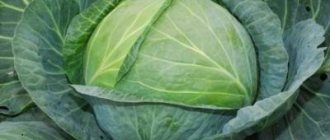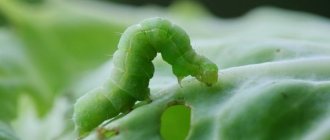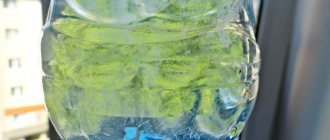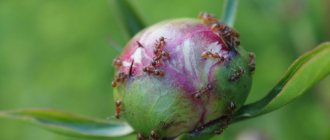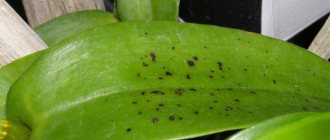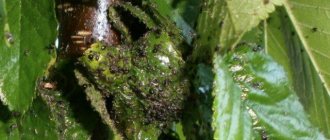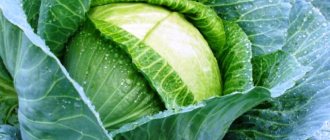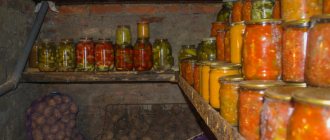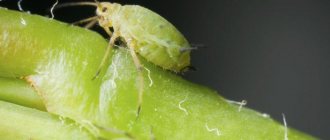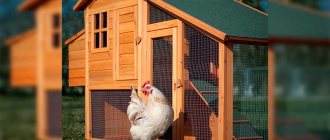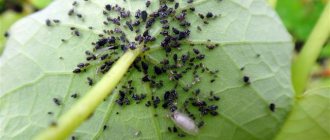Home / Pests and diseases
Back
Published: 06/10/2019
0
Rate this post
Colonies of aphids, an insignificantly small but voracious insect, multiply quickly and can cover large areas. Raspberries suffer from aphids, as well as blackberries, currants and rose bushes growing nearby.
You can detect aphids on raspberry bushes by visually inspecting the bushes:
- the growth of inflorescences stops, after which they begin to fall off;
- young shoots become shorter and deformed;
- Slimy spots with a shiny coating appear on the leaves and stems of raspberries. These are waste products of aphids;
- the affected leaves begin to curl into tubes, turn yellow, and fall off.
Procrastination is a mistake that inexperienced gardeners often make. If you notice at least one such sign, then immediately begin to destroy these insects, otherwise you will be left not only without a harvest, but, very likely, without the raspberry tree itself.
- 1 How to protect raspberry bushes 1.1 How to treat raspberries against aphids?
Symptoms of aphids on raspberries
A visual inspection will help determine the danger; signs of damage are visible to the naked eye. The insect settles on inflorescences, under leaves, on the tops. For early detection, the bush is checked at the stage of bud break. The second inspection is carried out during flowering.
The affected crop differs from the healthy one by yellowed, curled leaves. The buds stop developing and deformed flowers bloom from them.
Symptoms:
- drying and falling of inflorescences;
- deformation, shedding of leaves;
- drying out, bending of branches, stems;
- lack of opening of formed buds and fruits;
- mature leaves are covered with a sticky coating - honeydew;
- with serious lesions, sooty fungus develops on raspberries;
- white waste appears on the back of the foliage - old skin shed by insects.
Important! A method for early detection of raspberry aphids is the installation of white glue traps. They are tied in early spring, when the leaves begin to bloom. The method works throughout the entire growing season; all you need to do is shake the bush.
Fufanon
Aphid repellent Fufanon, a drug that perfectly fights against aphids and other insects that have a detrimental effect on cultivated plants. Belongs to organophosphorus agents.
- What is it produced in? Fufanon is a concentrated transparent emulsion. It is produced in transparent glass ampoules of 5 ml and small bottles of 10 ml.
- Chemical composition. The main component is malathion. Its amount in 1 liter of product is 570 grams.
- Mode of action of the drug. Once on cultivated plants, the substance is quickly absorbed into the stems, shoots and roots. After just 2 hours it causes paralysis and difficulty breathing in pests. Within 24 hours leads to their death.
- Duration of action. It does not lose its protective functions for 4-7 days.
- Compatibility. It is strictly prohibited to combine with other pest control products.
- When to use? Processing of vegetables, flowers, fruit trees and cereals is carried out in cloudy weather, without wind. It is better to do this work in the morning or evening. It is strictly prohibited to use during flowering, because the drug is highly toxic to bees.
- How to prepare the solution? Pour one 5 ml ampoule of the drug into clean water (its quantity should be 5 liters). The consumption rate is 1 liter of prepared solution per 10 m2.
- Mode of application. The prepared working liquid is poured into a sprayer and the plants are treated with it at the moment when aphids appear on them. Apply such an amount of solution to the plants so that it does not drip onto the ground. Eating processed vegetables immediately after spraying them with Fufanon can lead to poisoning.
- Toxicity. It has a toxicity class of 3, so it cannot cause any harm to humans. The treatment process must be carried out wearing a respirator or gauze bandage, as well as rubber gloves. The duration of spraying should not exceed 3 hours.
The drug is completely eliminated from vegetables and fruits within 20 days.
Poses an increased danger to fish and bees. The substance must not be allowed to enter rivers or other bodies of water.
Are ants on bushes a sign of pests?
- The life activity of aphids is accompanied by the production of excrement that attracts ants.
- Insects form a mutually beneficial symbiosis. Feeding on sweet secretions, the ants protect the aphids and transfer them to young, succulent leaves and shoots.
- The second method of spreading throughout the raspberry tree is through winged females flying from plant to plant.
- If crawling ants appear near the bush, be sure to check for infestation.
- Spray the areas where they accumulate with a solution of muracide or a similar product. Frequency: 2 times per summer.
Chemicals
Chemical repellents for aphids If there are a large number of insects on a plant, the pest cannot be controlled without chemicals. They should be used before buds open and flower, or after the last berry picking. The most effective drugs are:
- Aktara remedy;
- Aktellik;
- Inta-Vir;
- Kinmiks;
- Karbofos;
- Fitoverm;
- Spark;
- Tanrek;
- Fufanon.
To preserve the harvest, these products are diluted according to the instructions and sprayed on the raspberries using a spray bottle. Treatment is usually carried out on a dry, windless day.
What causes white aphids?
The main source of infection is low-quality planting material taken from industrial plantations. The pest is often brought in from neighboring areas.
The third reason for the appearance is a violation of agricultural technology:
- planting raspberries in the shadow zone;
- dense planting pattern;
- lack of processing, weeding.
The insect attacks bushes growing in open ground and is dangerous for varieties cultivated in closed ground conditions. Aphids are carried by the wind, penetrating into greenhouses through ventilation openings and windows.
Prevention measures
To avoid the appearance of the pest on raspberry plantings, it is necessary to follow the rules of agricultural technology:
- Plant bushes at the distance recommended for a particular variety.
- Take care of the health of the berry bush.
- Weed the area in a timely manner to prevent the migration of aphids from the weed to the raspberry bushes.
- Plant repellents (chamomile, wormwood, garlic) around the raspberry tree.
- Regularly carry out sanitary pruning of old and damaged shoots.
- Clear the area of fallen leaves under which pests hibernate.
- Treat anthills with insecticides to destroy them.
The gardener has enough helpers in the fight against aphids. If you make birdhouses and feeders on the site, then grateful birds will relieve some of the problems with pests of garden crops. Aphids also have natural enemies. These are ladybugs, lacewings and hoverflies.
Fungicide treatment
Chemicals quickly destroy all types of aphids, regardless of their stage of development. The process requires compliance with safety precautions and sanitary standards.
Spark
There are several drugs on sale:
- Iskra Bio – against aphids, mites. It is characterized by increased safety, is used before berry picking, and is effective in hot weather. Solution: 60 ml per 10 liters of water. Consumption: 1.5 l per bush;
- Spark Double effect is a universal tablet product. Non-toxic, fast-acting, contains potassium supplement. A working solution of 1.5 liters is sprayed for every 10 sq.m. raspberries;
- Golden spark is highly effective, provides long-lasting protection, and is not washed off by rain or watering. Solution: 5 ml of emulsion or 40 g of powder per bucket of water. Consumption: up to 10 liters per hundred square meters, depending on the number of aphids. Not for use on fruit;
- Iskra M – successfully works against aphids, sucking and gnawing insects. Compatible with fertilizers and many pesticides. Dissolves in water in a ratio of 10 ml per 10 l. Spraying is carried out in 2 stages - before flowering and after picking berries. Does not work on mature fruits. Consumption – 2 liters per 10 bushes.
Confidor
A new generation systemic drug will provide protection against aphids and other pests for a 30-day period. One or two sprayings are required per season. The asset of the product is safety and inability to accumulate in fruits. But, the solution is not sprayed during the ripening period of the berries and during the early harvest (no later than 30 days). Available in the form of a concentrated emulsion, wettable powder.
Rules of application:
- Confidor “Extra” and “Maxi” work against aphids;
- concentration – 70 g of powder or 1 ml of emulsion per 10 l;
- with a large concentration of pests, the consumption doubles;
- For a bush up to 1 m, 1.5 liters are consumed, above 1 m - 3 liters.
Important! When spraying, wear a plastic raincoat from head to toe, with a hood with an elastic band around the face, a respirator, rubber boots, and gloves. Process raspberries in calm weather.
Basic methods of struggle
Chemical insecticides are used to kill the pest. You can get rid of aphids on raspberries using folk remedies. This method is cheaper and does not harm the environment. Homemade recipes are chosen if there are few aphids. For insect infestations, synthetic fungicides are used.
Before treating the bush with a ready-made pesticide, neighboring plants that are not affected by harmful insects are covered with plastic film.
Garlic water
The spraying solution is prepared from plant shoots. Half a bucket of green mass is filled with five liters of water. Add 10–15 cloves of garlic. The crushed spice is soaked in boiling water and infused for 24 hours. The composition has a pungent odor that repels pests.
Read the article here for infusion of garlic against aphids, processing and methods of preparation.
Hot pepper
This is an effective remedy for aphids on raspberries. Pests cannot tolerate strong aroma. One teaspoon of pepper or crushed ripe pod is poured with a small amount of boiling water, covered tightly with a terry towel, and left for an hour. Before use, the concentrate is diluted in water in a ratio of 1:10.
Attention! During the period of fruit ripening, hot pepper should not be used.
Onion infusion
This option is often used by summer residents. The recipe for making the tincture is as follows:
- the peeled onion is crushed, ground, poured with warm water;
- recommended proportion – 0.5 kg/5 l;
- the solution is infused for three days, then filtered;
- squeeze out the resulting onion pulp.
The mass is diluted in water and sprayed on the raspberry bush to repel aphids, as well as other insect pests.
Tobacco dust
The product has a nerve-paralytic effect on insects. Effective against all types of aphids. Individuals quickly die from tobacco dust. The only drawback is that the substance is washed off by rain. The treatment is carried out using the dry pollination method or the raspberry fields are sprayed with a mixture of water in a proportion of 100 g. tobacco dust per liter.
Interesting! There are combined formulations of tobacco dust with mustard powder or tree resin. Such mixtures have fungicide properties.
Infusion of tomato tops
A kilogram of organic material is added to a bucket of water. Boil and stand for five hours. Spraying raspberries with this product helps remove aphids and other insect pests.
Laundry soap
The damaging properties of the product are explained by the increased content of fatty acids, in particular caproic acid. It destroys up to 90% of pests. Typical recipe:
- the soap is ground on a coarse grater;
- the shavings are filled with two liters of water;
- stir until a thick soap solution is formed;
- the concentrate is diluted with 8 liters of warm water.
If the aphid population is small, it is enough to treat the branches and foliage with the composition. In case of pest invasion, finely dispersed spraying of shrubs is performed.
Dandelion infusion
Treating berry bushes with such a solution not only destroys insect pests, but also inhibits pathogenic bacteria. Dandelion is a natural insecticide. To prepare the solution, the plant is crushed, filled with water, and left for 5 hours.
Formula milk
The animal product is mixed with iodine to spray raspberry fields. When dried, the milk forms a thin film, which protects the bushes from aphids and pathogenic microorganisms.
What to do and how to fight in different seasons?
The method of fighting depends on the time of year. The number of pests and the phase of plant development are taken into account.
in spring
Before the buds open, in early spring, abundant spraying of the root zone and shoots is carried out. Any ready-made solutions are used: contact, systemic insecticides with long-term action. Treatment begins after the snow melts, when daytime temperatures have settled at +5-10 degrees.
In the middle zone, protective measures take place at the end of March, in the south on the 10-15th of the month. In the Ural and Siberian regions, primary spraying is carried out in early April. The pest will be destroyed and will have time to decompose before flowering begins.
What to do:
- The solution is applied on a windless, sunny day, in the morning or at sunset.
- overwintered mulch and plant remains are removed;
- after inspecting the bushes, sanitary pruning is carried out;
- chemical treatment is carried out.
During flowering
- Protective measures should be started as early as possible, during the bud formation phase. Usually this is the end of May - beginning of June.
- Chemical solutions used before bud break and copper-containing preparations are taken.
- During the period of bee pollination, chemicals are prohibited. To protect the flowering bush, biological and folk remedies with a short period of action are used. Otherwise, the treatment will repel beneficial insects.
During the fruiting period
- Raspberry pulp can accumulate chemical compounds, which can cause an allergic reaction or poisoning.
- Traditional methods of control are used that affect the nervous system of pests and cause their death.
- Chamomile successfully copes with this. The solution (1 l/3 tbsp) brewed for 15 minutes is filtered, brought to a volume of 3 l and sprayed onto all parts of the bush. Frequency – once a week.
Actions after picking berries (September-October):
- repeat the chemical treatment that was carried out in early spring;
- raspberries can be sprayed with aggressive compounds (Fufanon, Intavir);
- When the weather gets colder, the soil between the rows is dug up. Watering is carried out with iron sulfate (according to the instructions) and wood ash is added. Consumption – 100 g per sq.m.
Reviews
I'm already tired of fighting aphids on raspberries. I don’t know what kind of attack this is, before I didn’t have any aphids, but now they are on cucumbers, eggplants, peppers and all fruit trees. I tried everything from folk remedies. To be honest, nothing really helped me. It seems that after treatment with garlic and ash there were fewer insects, but they were still there. I was afraid to use chemistry, but since nothing was helping, I decided to do it. The store advised me to buy contact and intestinal type drugs. Systemic drugs enter the plant tissue and, as a result, spread throughout the entire bush, including the berries. But contact and intestinal ones only affect the pest and are not absorbed by the plant. Having learned these subtleties, I somehow felt more comfortable using “chemistry”
Gardeners are advised to purchase raspberry seedlings exclusively from specialized nurseries, where phytosanitary inspections are regularly carried out and harmful insects are monitored. It is almost impossible to bring aphids along with seedlings from such nurseries to your plot.
Mistakes of beginner gardeners
The main mistake is treating plants in rainy, hot, windy weather. The active ingredients are destroyed by UV rays and washed off by raindrops.
Other risk factors:
- incorrect choice of planting material;
- dense planting pattern;
- incorrect concentration of chemicals;
- improper application of fertilizers;
- too frequent irrigation;
- lack of autumn processing of raspberries.
Safety precautions
Chemicals used to control raspberry pests are inherently poisonous.
To maintain your health, you must remember and strictly follow the precautions when working with chemical plant protection products:
- Never store them near food, grains, or cereals.
- The container in which the solution was prepared should not be used again. After processing, it and all auxiliary materials must be thoroughly washed and dried. It is advisable to store it separately.
- When spraying bushes, wear a cotton-gauze bandage and overalls.
- While working, you must not eat, drink or smoke.
- It is strictly prohibited for children, pregnant and nursing mothers to treat plants.
- Hide the medications in a place where they are out of reach of small children and pets. Do not throw away instructions and labels.
- Do not leave the remaining solution for next time, pour it out immediately.
It is also important to know that not all drugs are compatible, for example, you cannot mix sulfur and iron sulfate, as well as chlorophos and karbofos with Bordeaux mixture
Flowering period
At this time, you have to approach the treatment of raspberries against aphids carefully. Most industrial preparations are unsafe for all insects, and if you treat a raspberry bush with flowers, you may not get a harvest. Flower-pollinating bees will die out along with pests.
There are relatively harmless industrial bio-insecticides whose action is based on microbes. The biological product “Strela” is one of them. Treating raspberries against aphids during flowering with these products will not prevent bees from pollinating the flowers.
You can also fight with traditional means, but their effectiveness is lower and it is most targeted to use these methods during fruiting.
Soil care
Pests spend the winter in the ground near the stems of plants on which they parasitize. It is worth stopping the paths of their exit outside with the onset of the warm season.
In the spring, you can repel parasites by mulching the near-root zone of plants or the bed with humus and straw. In this case, insects will look for a way out to the side, and not up.
In the spring, the soil in the raspberry bed or under individual bushes is carefully loosened, after which organic fertilizers are applied and watered. After the spring rains, the soil around the stem also needs to be loosened - the plant likes the soil around the plant to “breathe”.
Stagnation of water near the roots is unacceptable for raspberries. This moisture-loving plant takes as much water as it needs, and excess can lead to rotting of the roots. Therefore, it is necessary to loosen the soil in a timely manner after watering and not allow water to stagnate in it.
Spring treatment of raspberry bushes against parasites and diseases is the determining process for obtaining a high-quality harvest. These plants will respond positively to careful care and will bear fruit well.
